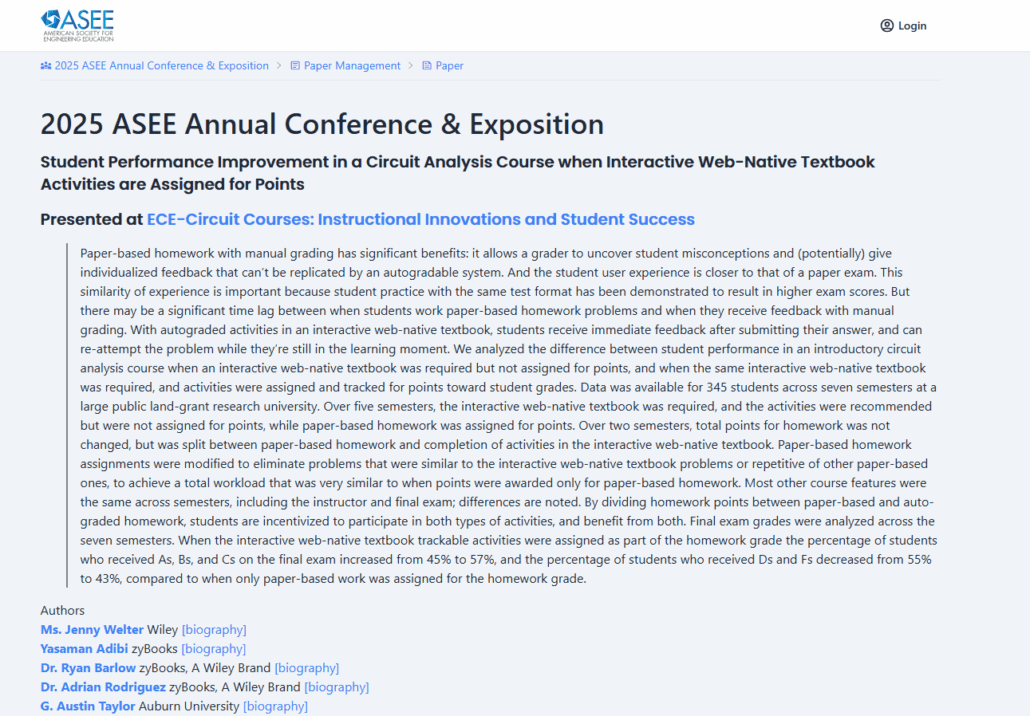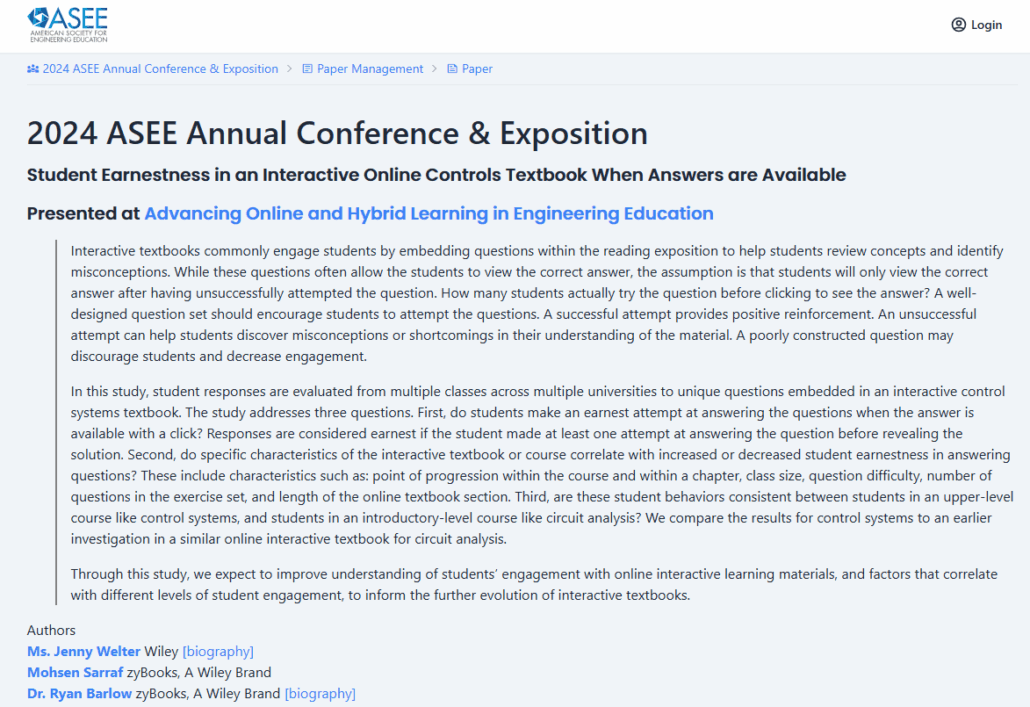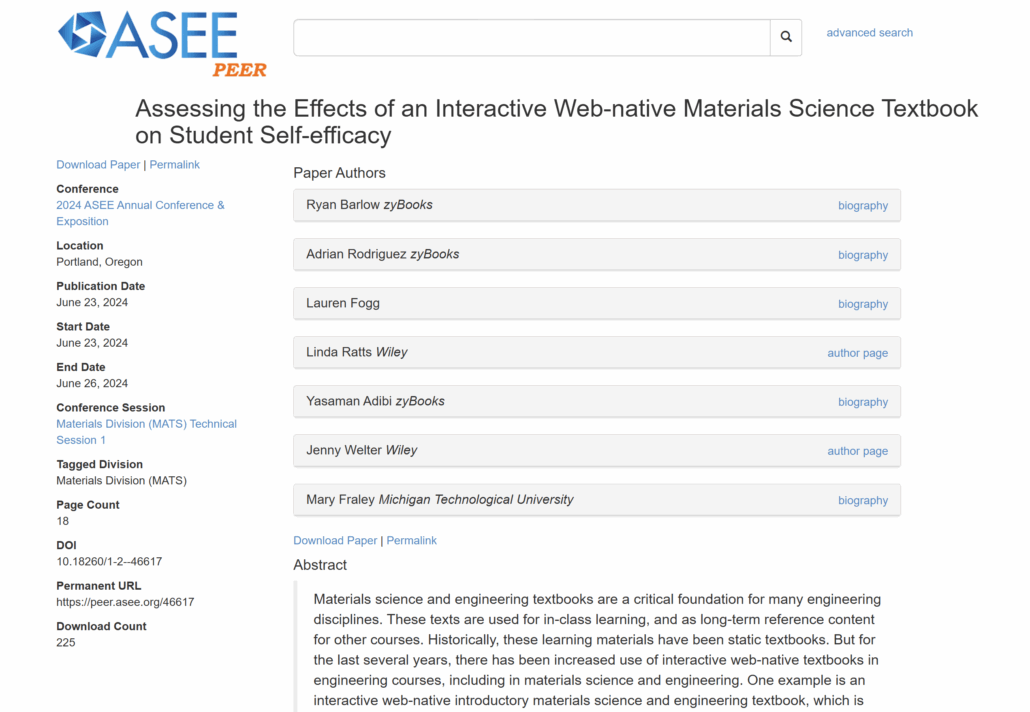The Research Behind the Results: How Peer-Reviewed Studies Validate zyBooks’ Effectiveness
zyBooks stands alone among major educational publishers in conducting peer-reviewed research on our platform’s effectiveness. While competitors rely on testimonials and marketing claims, we submit our findings to rigorous academic scrutiny through peer- reviewed conference proceedings and journal articles.
Recent studies demonstrate measurable improvements in the factors that matter most for student success: engagement, learning quality, and self-efficacy.
Study: Transforming Reading Compliance into Engagement and Improved Grades

Every instructor knows the problem: only 20-30% of students read traditional textbooks before class. This means most students encounter material for the first time during lecture, undermining any instructor’s active learning efforts to progress in topic depth and breadth.
Two studies (here and here) tested a simple intervention: making interactive reading count for grades.
The results were dramatic. Assigning any percentage of the grade to interactive reading corresponded to over a 35% increase in content completion. More importantly, the higher the assigned percentage, the greater the completion increase. Final exam performance improved significantly. The percentage of students earning As, Bs, and Cs on the final exam increased from 45% to 57%, while those earning Ds and Fs decreased from 55% to 43%. The interactive elements with immediate feedback made it impossible to fake comprehension through passive skimming.
The implication is clear: tying reading directly to a portion of the student grade fundamentally transforms student preparation and performance.
Study: Measuring Authentic Learning Through “Earnestness”

Completion rates tell only part of the story. We’ve all seen students click through online homework just to earn points without genuine learning. This challenge prompted researchers to dig deeper into the quality of student engagement.
Two studies (here and here) published in 2023 and 2024 examined the “earnestness” of students, defined by whether students tried to view answers in advance of making attempts on problems.
The platform’s design naturally encouraged authentic engagement. The interactive animations —which require viewing all steps in sequence— and questions based on those animations ensure students are engaged with concepts rather than racing through. In both studies, the majority of students were found to make genuine attempts at problems prior to requesting hints or checking for the answer.
Study: Building Self-Efficacy in STEM

Student confidence—their belief in their ability to succeed—directly impacts persistence in challenging STEM courses. Yet traditional textbooks often undermine confidence through their sink-or-swim approach to complex topics.
This study surveyed 106 students using the interactive zyBook and 135 students using traditional online courseware.
Students using zyBooks reported significant increases in self-efficacy. The majority indicated that interactive elements contributed to their success in the course, increased their understanding of content, and boosted their confidence in solving engineering problems. The key mechanism was the combination of animations, learning questions, and virtual materials science modules that provide guided practice with immediate feedback.
This matters for retention. Students with higher self-efficacy are more likely to persist through difficult courses and complete their degrees. The interactive approach transforms traditionally intimidating topics like crystallography into manageable learning experiences.
The Convergence of Evidence
These three peer-reviewed studies reveal a clear pattern of what works in digital learning:
- Engagement and grades increase when interactive content counts toward grades, with measurable improvements in exam performance
- Properly designed interactive elements encourage student earnestness in engineering problem solving
- Confidence builds through guided practice with immediate feedback, particularly in challenging topics
These aren’t marginal improvements—they represent fundamental changes in how students interact with course material. The peer-reviewed evidence shows that interactive learning platforms can address the persistent challenges instructors face: getting students to read, ensuring they learn rather than just complete tasks, and building the confidence they need to succeed.
We invite you to review the full studies linked above, examining the methodologies and data yourself. Better yet, test these findings in your own classroom. Because ultimately, the most compelling evidence for any educational tool comes from its impact on your students.
Explore zyBooks for your course or join our growing community of instructors contributing to ongoing research in evidence-based teaching (Click here).





